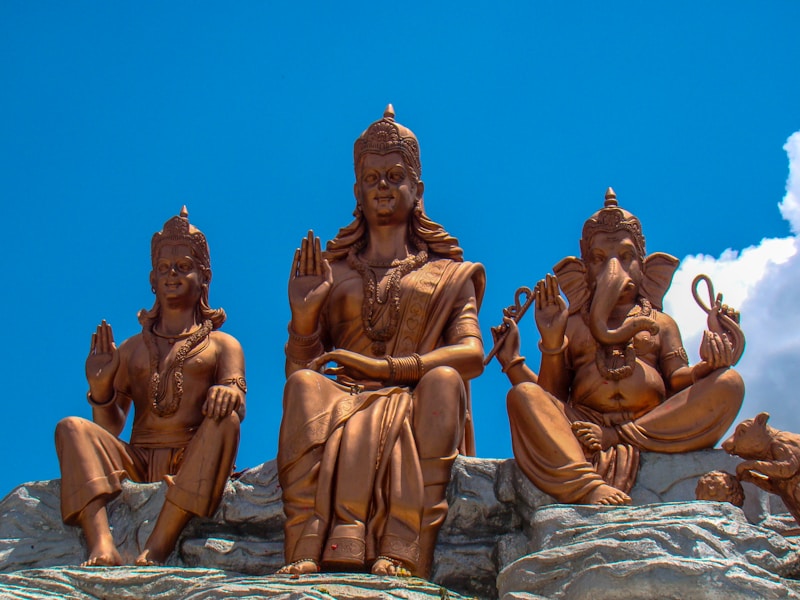Questions and Answers
What is the genitive case marker used in Hindi for possession?
ka
Which word order does Hindi typically follow for sentences?
SVO
What is the direct speech verb form used in Hindi?
kahaa
Which aspect of Hindi grammar makes it a tonal language?
Signup and view all the answers
What does the postposition 'ne' indicate in Hindi sentences?
Signup and view all the answers
How does Hindi differ from Sanskrit in terms of word order?
Signup and view all the answers
Which aspect of Hindi grammar involves variations in gender, number, and case for pronouns?
Signup and view all the answers
What is a key characteristic of the gender system in Hindi?
Signup and view all the answers
Which famous Hindi writer is best known for his/her collection of poems titled Gitanjali?
Signup and view all the answers
Which Hindi writer is renowned for the critical examination of social issues like caste, gender, and class in his/her works?
Signup and view all the answers
Who was a pioneer of feminist writing in India and wrote an autobiographical novel translated into Hindi as Mera Katha?
Signup and view all the answers
Which Hindi poet is compared to renowned poets like Rabindranath Tagore and Amrita Pritam for her unique style of writing?
Signup and view all the answers
Study Notes
General Hindi: A Guide to Language and Literature
Hindi, the fourth most widely spoken language in the world, is more than just an everyday means of communication in India. It is a rich linguistic tapestry, encompassing diverse dialects, a sophisticated grammar system, and a vibrant literary heritage. In this exploration, we'll delve into the intricacies of Hindi grammar and highlight a few influential Hindi writers who shaped the landscape of Hindi literature.
Hindi Grammar: A Structured Framework
The Hindi language conforms to a systematic grammar structure, which is a blend of Sanskrit grammar and Perso-Arabic influences. Some key aspects of Hindi grammar include:
-
Nouns and Adjectives: Hindi generally uses the genitive case for possession, marked by the postposition ka. For example, ghar (house) + ka + maa (mother) = gharkī mā (mother's house).
-
Verbs: Hindi follows a subject-verb-object (SVO) word order, though in colloquial speech, the verb is often dropped, resulting in a subject-object (SO) word order.
-
Direct and Indirect Speech: Like in most Indian languages, Hindi uses a dedicated verb form to represent direct speech. For example, mein kahaa thaa (I said) for direct speech and mein ne kaha ki (I said that) for indirect speech.
-
Word order and Tone: Hindi is a tonal language, with three distinct tonal variations. The word order is also sensitive to the type of sentence, for instance, interrogative sentences often use a different word order than declarative sentences.
-
Pronouns: Hindi has a complex pronoun system, with gender, number, and case variations. For example, ham (we) can change to hum (we, masculine) or hain (we, feminine).
-
Gender: Hindi has a strict gender system, where nouns, adjectives, and pronouns are divided into masculine, feminine, and neuter categories. For example, lal (red) + gulab (flower) = lal gulab (red flower, masculine) or lalī gulab (red flower, feminine).
-
Numerals: Hindi has a decimal numeral system, with the numbers 1 to 9 being indicated by separate words. The numbers 10 to 99 are indicated using two words, with the tens digit preceding the ones digit.
Famous Hindi Writers: Pioneers of Literary Expression
The rich tradition of Hindi literature has been shaped by some of the most influential writers in the Indian subcontinent. Here's a brief overview of a few key figures:
-
Rabindranath Tagore (1861-1941): Although not exclusively a Hindi writer, Tagore's vast body of work includes writings in Hindi, and his influence on modern Hindi literature is undeniable. He is best known for his collection of poems, Gitanjali, which earned him the Nobel Prize in Literature in 1913.
-
Premchand (1880-1936): Popularly known as Munshi Premchand, he is one of the most celebrated Hindi writers of the 20th century. His works, which include novels and short stories, are known for their critical examination of social issues, such as caste, gender, and class.
-
Kamala Das (1934-2009): Born in Kerala but later writing extensively in Hindi, Kamala Das was a pioneer of feminist writing in India. Her autobiographical novel, Ente Kathanal (My Story), was translated into Hindi as Mera Katha (My Story), giving voice to the experiences and struggles of women in Indian society.
-
Mahadevi Varma (1907-1987): Mahadevi Varma was a prominent Hindi poet, known for her unique style of writing and her contribution to modern Hindi poetry. She is often compared to renowned poets like Rabindranath Tagore and Amrita Pritam.
-
Amrita Pritam (1919-2005): Amrita Pritam was a celebrated Punjabi poet, novelist, and short story writer. Her work in Hindi, which includes poems, stories, and essays, showcased her empathetic understanding of the human condition.
This brief exploration into the world of General Hindi only touches upon the tip of the iceberg. The Hindi language, with its rich history and vibrant literary heritage, continues to captivate and inspire millions of people globally. Whether you're a language enthusiast or literary scholar, there's always something new to discover in the world of Hindi.
Studying That Suits You
Use AI to generate personalized quizzes and flashcards to suit your learning preferences.
Description
Delve into the structured framework of Hindi grammar, including nouns, verbs, direct and indirect speech, pronouns, gender, numerals, and more. Learn about influential Hindi writers like Rabindranath Tagore, Premchand, Kamala Das, Mahadevi Varma, and Amrita Pritam who have made significant contributions to Hindi literature.


